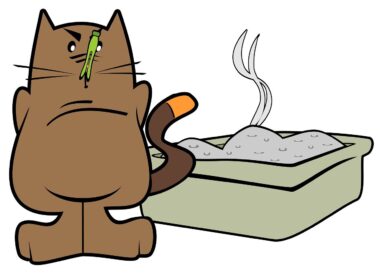Signs Your Cat’s Anxiety is Affecting Their Health
Cats are known for their independent nature, but they can experience anxiety that negatively impacts their health. Understanding the signs of anxiety is crucial for cat owners. Common behaviors include excessive grooming, where cats lick themselves to the point of creating bald patches or wounds. Changes in eating habits can also signify anxiety; a stressed cat may refuse to eat or overeat. Furthermore, if your cat begins hiding more than usual or avoids human interaction, these could be signs of anxiety. Additionally, excessive vocalization or aggression towards other pets can indicate that something is troubling them. Cats may also exhibit symptoms through physical health issues, such as vomiting, diarrhea, or lethargy. The connection between anxiety and physical health should not be overlooked. Providing a stable and nurturing environment is essential. It might also help to consult with a veterinarian or an animal behaviorist to create a safe plan to manage the signs of anxiety in your cat. Understanding these behaviors can aid in ensuring that your feline companion remains happy and healthy. Remember to observe your cat regularly to detect any changes.
Understanding the Causes of Cat Anxiety
Anxiety in cats can arise from various sources, including changes in their environment. Moving to a new home, introducing a new pet, or even rearranging furniture can trigger stress. Furthermore, changes in the owner’s routine or lifestyle, such as long work hours, can alter a cat’s sense of security. Additionally, traumatic experiences, like being abandoned or having a prior negative experience with another animal, can lead to ongoing anxiety. Other factors include a lack of socialization during critical developmental periods, or prolonged exposure to stressors, such as loud noises or aggressive household pets. Health issues can also contribute; for example, a cat in pain might become anxious or withdrawn. Therefore, ensuring regular veterinary check-ups can help identify underlying medical problems that might increase anxiety levels. Creating a safe space where your cat can retreat when feeling overwhelmed is essential. This area should include their favorite toys and blankets to provide comfort. By understanding the various causes of anxiety, you can take preventive measures to promote a peaceful and secure environment for your cat, ultimately protecting their health and well-being.
Cats may express anxiety in various ways, which can sometimes lead to confusion among owners. It’s crucial to recognize individual signs that reflect your cat’s emotional state. One notable signal is a change in their litter box habits. If your cat starts urinating or defecating outside the box, it could be a reaction to anxiety. Similarly, a cat that suddenly becomes extremely clingy or excessively seeks attention may be trying to cope with stress. Another important behavior to note is the loss of interest in regular activities, such as play. An anxious cat might spend more time sleeping or hiding. Keep an eye on your cat’s body language as well; flattened ears, a tucked tail, or dilated pupils are indicators of distress. Also, a cat that suddenly becomes aggressive might be feeling threatened. Equally, excessive scratching at furniture or curtains can result from pent-up energy due to anxiety. Each cat has unique traits that express their feelings, so consistently observing and understanding your cat’s behavior is vital for effective management of anxiety while ensuring their emotional and physical health.
Minimizing Anxiety with Environmental Enrichment
Providing environmental enrichment can significantly decrease anxiety levels in cats. Enrichment involves adding physical and mental stimulation to your cat’s environment. Start by creating vertical spaces; cats love climbing and perching on heights. This can be achieved using cat trees or shelves that they can explore and lounge. Interactive toys, such as puzzle feeders, stimulate their minds and keep them engaged, reducing anxiety stemming from boredom. Additionally, safe outdoor access, like a catio, can offer new experiences that enhance their quality of life. Regular playtime sessions using feather wands or laser pointers also help to build trust and bond with your cat, alleviating stress. Creating a calm atmosphere is equally important; consider using calming pheromone diffusers or sprays designed to help reduce anxiety. Soft music or white noise machines can drown out startling sounds that might trigger stress. Maintaining a consistent routine regarding feeding, grooming, and playtimes helps cats feel secure and reduces uncertain feelings. By understanding and implementing these environmental enrichment strategies, you can contribute significantly to your cat’s overall well-being, promoting a relaxed state, which ultimately protects their health.
It’s essential to monitor your cat’s overall health regularly, as prolonged anxiety can lead to significant health problems. Cats experiencing stress often develop behavioral problems, leading to physical health concerns. For example, consistent grooming due to anxiety can result in skin infections or other dermatological issues. Gastrointestinal problems, like diarrhea or vomiting, are also common symptoms of an anxious cat. Even dental health may be negatively affected as stressed cats might fail to maintain oral hygiene. Weight changes can also hint at anxiety; since some cats under-eat while others over-indulge to compensate for their stress, ensuring they have proper dietary choices is crucial. If noticeable changes occur, reach out to a veterinarian for diagnosis and treatment suggestions. Early intervention can prevent or mitigate chronic issues linked to anxiety in cats. Behavioral therapies, combined with holistic approaches and medication when necessary, can help. Frequent veterinary visits ensure you stay ahead of potential health problems and maintain your cat’s wellness. Providing validation through understanding fosters a nurturing environment where your cat can feel safe and secure.
Seeking Professional Help for Your Cat
If you suspect your cat suffers from anxiety that affects their health, seeking professional help can be immensely beneficial. Veterinarians can assess your cat’s condition, ruling out medical issues contributing to anxiety symptoms. They may recommend behavioral therapists or animal behaviorists who possess specialized knowledge in managing feline anxiety. Professional guidance can result in targeted strategies tailored specifically for your cat’s needs, allowing for more effective management. Additionally, professionals can provide insights regarding potential medication options that assist with anxiety levels. Don’t hesitate to ask questions or express concerns during consultations; understanding the recommended strategies is a key component of successfully supporting your cat. Furthermore, consider joining community support groups where members share similar experiences and solutions with their anxious pets. These connections can bring valuable insights and encouragement, making it easier to navigate challenges. Investing time in understanding resources and professional assistance gives both you and your furry friend the best chance for a happier, less anxious life. Prioritizing their mental health is essential for the overall well-being, enabling them to thrive in a trusting environment.
In conclusion, understanding and addressing cat anxiety is vital for maintaining your cat’s health and overall well-being. Each cat is unique, and their signs of anxiety may vary, so it is crucial to be observant and proactive. Identifying the root causes of anxiety allows you to implement appropriate solutions. Ensuring a stable environment that promotes comfort is as important as regular veterinary care. Cats rely on their human companions to help them navigate their emotional challenges, and recognizing that mental health impacts physical health is critical. Through proper enrichment, environmental adjustments, and professional support when needed, you can significantly reduce stress in your cat’s life. Remember, a happy cat leads to a joyful home, positively affecting the entire household. By prioritizing your cat’s emotional health, you not only enhance their quality of life but also strengthen the bond you share. It’s your responsibility to create a nurturing and loving atmosphere that fosters their well-being. Ultimately, understanding your cat’s needs and emotions will lead to a happier, healthier, and more fulfilling relationship over time.





